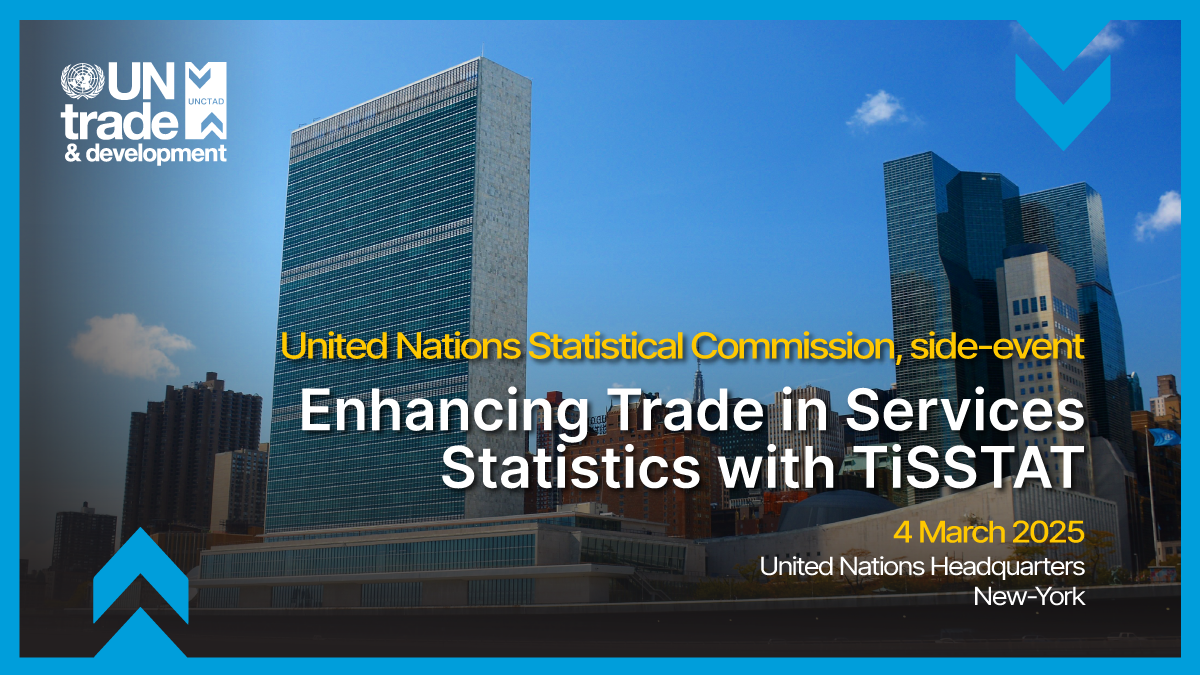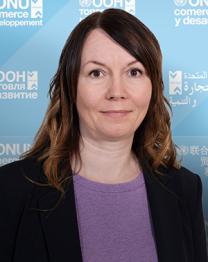
The global trade landscape is increasingly dominated by services, spanning finance, technology, tourism, education, and beyond. As services trade becomes a key driver of economic growth, the need for accurate, timely, and comparable trade in services statistics is more critical than ever. However, many countries face persistent challenges in compiling such data due to methodological complexities, resource constraints, and evolving international standards.
Objective
This side event aims to showcase the Trade-in-Services Information System (TiSSTAT), developed by UNCTAD, as an innovative solution to these challenges. TiSSTAT is designed to enhance the capacity of national statistical institutions, providing them with tools to collect, compile, and disseminate trade in services data that meet international standards.
Key features of TiSSTAT
- Integrated Questionnaire: Simplifies data collection from various stakeholders.
- Multi-User Application: Facilitates collaboration among statistical offices.
- Methodology Options: Offers flexibility in adopting international standards like MSITS 2010 and IMF BPM6.
Importance of services trade and data challenges
Services trade contributes significantly to global GDP and employment, driving innovation and competitiveness. Yet, data gaps hinder policy-making and international negotiations. TiSSTAT addresses these gaps by ensuring accurate data collection, thus supporting evidence-based policies that enhance countries' integration into global services markets.
Event highlights
Participants will share country and international experiences, discuss the technical aspects of TiSSTAT, and engage in discussions on improving statistical capacities in this area. The event will emphasize TiSSTAT's role in:
- Strengthening national statistical systems.
- Enhancing data quality and comparability.
- Supporting sustainable trade policies through reliable statistics.
Conclusion
The side event will provide Chief Statisticians with a unique opportunity to explore how to enhance national trade in services statistics, including with TiSSTAT, to address data and quality challenges, and provide more detailed and harmonized information for more evidence-based trade policy. We look forward to an engaging session and your valuable participation.

Anu Peltola is the Director of UNCTAD Statistics, Data and Digital Service overseeing the statistical, digital transformation and information technology work of the UN Trade and Development. She supports countries in measuring Sustainable Development Goals (SDG) indicators on trade, maritime transport, investment, illicit finance, South-South cooperation, and enterprise sustainability. Anu brings over 25 years of experience in official statistics at both the national and international levels.
She serves as the UNCTAD Chief Statistician coordinating internal, UN system-wide and international statistical and data efforts, including initiatives such as beyond GDP and the cost of SDG transitions. She is the co-chair of the UN system Chief Statisticians (CCS-UN) and the Committee for the Coordination of international Statistical Activities (CCSA) consisting of 45 international organizations. Her team also contributes to the development of new statistics and methodologies and supports UNCTAD programs in creating and delivering innovative, AI-assisted data management platforms for diverse domains such as non-tariff measures, informal cross-border trade, international investment policies, laws and regulations. It helps enhance countries' statistical capacity in measuring trade and development, for instance through the Trade-in-Services Statistics information system (TiSSTAT), a modern tool for national statistical authorities, as well as through a new set of indicators on gender equality in trade and the inclusive growth index (IGI). UNCTAD's statistics are released in UNCTAD Data Hub and Data Insights always reflecting the latest data in UNCTADStat and SDG Pulse sharing the latest data-driven analysis.
Before joining UNCTAD, Anu was engaged in preparing Chief Statisticians’ meetings under the Conference of European Statisticians in UNECE and coordinated international efforts to develop guidance for instance on modernising statistical legislation and enhancing the value of official statistics. She established a new joint work stream for climate and statistical communities. Previously, she worked in Statistics Finland serving as Head of Statistics and Head of Development in short-term economic, business and household statistics.
Dr. Steve MacFeely is the Chief Statistician of the OECD and Director of the Statistics and Data Directorate. He is also an Adjunct Professor at the Department of Economics at University College Cork in Ireland. He chairs the Advisory Board of the Statistical Journal of the IAOS, the UN’s Productive Capacity Index Statistical and Technical Expert Group, and the Advisory Board of the International Statistics Literacy Project. Steve is an elected member of the International Statistics Institute. Prior to joining the OECD, Steve served as the Director of Data and Analytics at the World Health Organization.He also served as Director of the UNCTAD Statistics, where he played a key role in the development of TiSSTAT.
Before joining the UN, he was the Deputy Director-General at the Central Statistics Office (CSO) in Ireland.
Laurent Hounsa is the Director-General of INSTaD and the Chief Statistician of Benin. Before joining INSTaD, Laurent worked for BCEAO (Central Bank of West African States). He played a pivotal role in the UNCTAD-UEMOA Trade-in-Services Project, contributing significantly to the development of the questionnaire used for collecting trade-in-services data. Drawing from his extensive experience at BCEAO, he represented the institution in this project and helped shape the statistical frameworks that would later support the development of TiSSTAT. Laurent has continued to support the development and implementation of TiSSTAT, transitioning from a key contributor to a user of the tool in his current role. His expertise in economic statistics and external accounts has been instrumental in advancing trade and services data collection in the region. Prior to his leadership role in Benin, he worked as the Head of the Balance of Payments Service at BCEAO, contributing to the development of external accounts for the UEMOA region. His career has been marked by a deep commitment to enhancing statistical capacity and the use of data for informed policy-making in West Africa.

Georgina Alcantar-López is a Biologist with a Master's in Biological Sciences, specializing in Environmental Analysis. MSc Alcantar has over twenty-five years of experience generating, managing, compiling, integrating, and systematizing environmental information and various information systems for different purposes. MSc Alcantar has experience in statistical modeling of biological and ecological processes, including predictive perspective, spatially explicit data, scenario building and information for the decision-making process, conflict analysis, land planning, and land suitability analysis. Her career encompasses academia, consulting, and public service roles, notably as the environmental statistics director for Mexico's Ministry of Environment and Natural Resources for thirteen years. She has collaborated with diverse stakeholders, from NGOs to international authorities. Currently, she leads the Unit of Environment Statistics, Climate Change, and Disasters at ECLAC.

Suad Al-Azki is the Director of the Department of Geographical, Environment, and Tourism Statistics at GCC-Stat. With over 20 years of experience in statistics—including 8 years specializing in environment, energy, and tourism—she previously spent 10 years at the Ministry of Higher Education in Oman. Suad is a member of several UN expert groups, including those on disaster statistics, environment and climate change statistics, and sustainable tourism. At GCC-Stat, she plays a key role in harmonizing and standardizing data, methodologies, and classifications across GCC countries in alignment with international standards.




